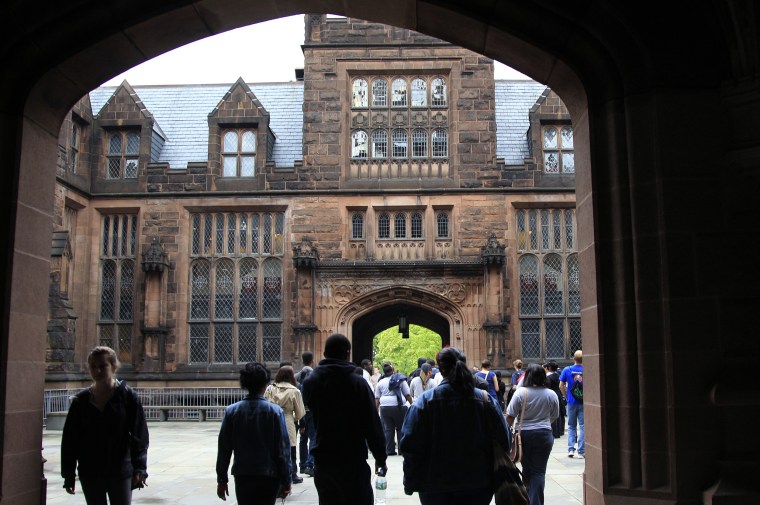U.S. News & World Reports' 2022-2023 rankings of the country's best colleges is out today, and for the 12th consecutive year, Princeton University in Princeton, New Jersey, tops the list for national universities.
Massachusetts Institute of Technology came in second place again this year as well, while Harvard University, Yale University, and Stanford University tied for third.
In reaction to the news, Princeton's Director of Media Relations Michael Hotchkiss told TODAY Parents, "Princeton is committed to contributing to the world through teaching and research of unsurpassed quality. To do that, we strive to support a diverse community and offer financial aid that allows students from a wide range of backgrounds and experiences to graduate debt-free and impact the community and world around them. Of course, we appreciate when those efforts are recognized."
However, Hotchkiss added, Princeton University President Christopher Eisgruber has warned before that he does not consider rankings the best tools for making college decisions.
"We recommend prospective students rely more on resources such as the Department of Education’s College Scorecard that allow comparisons among institutions on important measures including the graduation rate for students from similar backgrounds, post-graduation outcomes, net cost, and student and faculty engagement," said Hotchkiss.
Williams College in Williamstown, Massachusetts, was named the number one liberal arts college in the country for the 20th year in a row, edging out Amherst College and Pomona College in second and third place spots, respectively.
The annual guide for prospective students and their families evaluated 1,500 colleges and universities on up to 17 measures of academic quality.
Metrics measuring outcomes relating to the universities’ students — such as the amount of debt they leave college with and graduation and retention rates — weighed most heavily in the rankings, accounting for 40% of the calculations. Other factors included the percentage of alumni giving, academic reputation among peer institutions, financial resources, class sizes, and student to faculty ratios.
The list generated more controversy than usual this year when one of Columbia University's own professors raised questions this summer about the accuracy of data the university had provided to U.S. News & World Report in 2021 that led to its #2 ranking on last year's list.
On Friday, Columbia's provost, Mary Boyce, released a statement summarizing an extensive internal review of the matter clarifying the inaccuracies that had been previously reported, particularly in the areas of class size and faculty holding terminal degrees.
"The Columbia undergraduate experience is and always has been centered around small classes taught by highly accomplished faculty. That fact is unchanged," Boyce wrote in the announcement.
"But anything less than complete accuracy in the data that we report — regardless of the size or the reason — is inconsistent with the standards of excellence to which Columbia holds itself. We deeply regret the deficiencies in our prior reporting and are committed to doing better."
Columbia fell to #18 in this year's rankings.
There were a few changes to the ranking methodology this year that accounted for the growing trend in test-optional and test-blind admissions policies. More consideration was also given to the percentage of highly credentialed faculty members regardless of employment contracts this year to reflect the growing number of part-time instructors.
"For nearly 40 years, the Best Colleges methodology has continuously evolved to reflect changes in the higher education landscape and the interests of prospective students," said Kim Castro, editor and chief content officer at U.S. News, in a press release.
"Guiding that evolution is U.S. News' mission of providing useful data and information to help with one of life's biggest decisions."
Among national public universities, two University of California campuses — Los Angeles and Berkeley — shared the number one ranking this year. They were followed by the Universities of Michigan–Ann Arbor and Virginia, which tied for third place, and the Universities of Florida and North Carolina–Chapel Hill, which tied for fifth.
Top regional universities this year included Rhode Island's Providence College, Butler University in Indiana, Florida's Rollins College, and the University of Portland in Oregon.
Related video:

